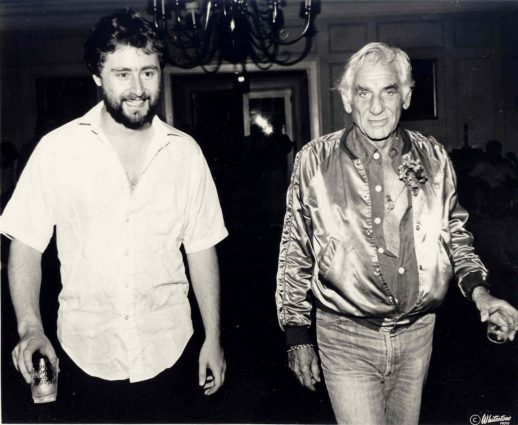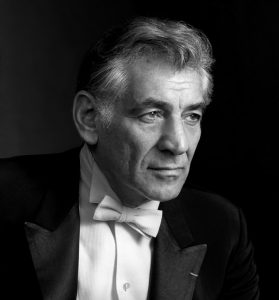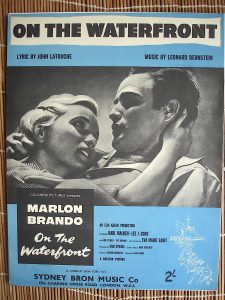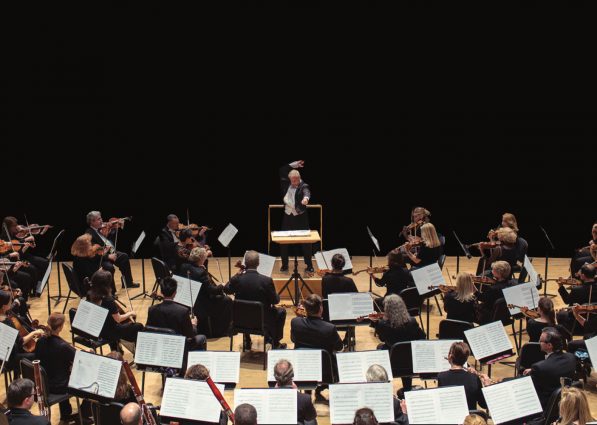He could have been a contender.
But Leonard Bernstein, whose centennial is being celebrated this year with musical tributes of all kinds, created only one original film score in his lifetime, for the Academy Award-winning 1954 crime drama “On the Waterfront” (Columbia Pictures, a Sony Co.). And conductor Piotr Gajewski, who Bernstein mentored, will bring that score to life in a special way when the National Philharmonic Orchestra performs live on the Strathmore Music Center stage as the movie plays above them.
“Because this was Bernstein’s first attempt, and he was an innovator, there are some things he tried that were completely new to film scoring,” said Gajewski, the National Philharmonic’s music director. “The score begins with a solo horn playing under the titles of the film — very unusual. There’s lots of percussion, some jazz aspects, saxophones, lots of unusual instruments. It’s fun on many levels.”

It’s especially fun for Gajewski, whose personal connection to Bernstein is something he treasures as the years go by. “I was very fortunate,” he said. “When I was 25 years old, I studied with him at the Berkshire Music Center at Tanglewood in Massachusetts. I was one of three conducting fellows that summer, and I got to direct with him and conduct with him. It was wonderful.”
Bernstein, who was born in 1918 and died in 1990, was more than just the composer of “On the Waterfront;” he was the musical director of the New York Philharmonic and a prolific composer of orchestral, choral and chamber music. He wrote the music for Broadway classics from “On the Town” to “Wonderful Town” to “Candide” to his masterpiece, “West Side Story,” and later became a pop culture icon with his television appearances, bringing classical music to the masses.
Gajewski said the National Philharmonic will be performing many Bernstein works this season; he sees this year-long celebration of his mentor’s work as a way to bring the music of Bernstein to a new generation. “It’s important that we talk about what he means to American music, perform his music and carry on the legacy,” he said.
David Sterritt is ready to talk. The longtime film critic and scholar will be on a pre-concert-and-film panel, answering questions about the film and the score. “Bernstein was an astonishing talent,” said Sterritt. “He was one of the great conductors of the 20th century; he conducted orchestras around the world. He was a really well-known TV personality in the ‘60s when a whole series of his ‘Young People’s Concerts’ was broadcast from Carnegie Hall. And he was a composer of all kinds of music. He really could do it all — an incredibly gifted composer with a great knack for dreaming up melodies and harmonies that stick in people’s minds.”

So why didn’t he do more in the film world? “This is the only original movie score that Leonard Bernstein ever wrote,” explained Sterritt. “He is probably most famous for ‘West Side Story,’ but that was a hugely successful Broadway musical and the score was simply imported into the movie when the movie was made. ‘On the Waterfront’ he actually wrote as an original movie score.”
According to Sterritt, Bernstein “wasn’t 100 percent happy about how his score was inserted into the movie,” and the composer decided he would never score another movie. “He was, at that time, an unbelievably famous musician; he’s probably still the most famous classical musician of the 20th century. He was used to having his own way.”
But movies are ruled by their directors, and “On the Waterfront” Director Elia Kazan had different ideas of how to use Bernstein’s music. Sterritt calls the movie “a really famous classic that’s still relevant today, something that really retains its power.” The story of boxer-turned-dockworker Terry Malloy, portrayed by Marlon Brando, as he fights crime and corruption on the docks as well his own personal demons, is thought by many movie scholars to have a deeper historical meaning.
“Part of the movie’s legend — and I’m not sure how many people are aware of this — is that it was directed by Elia Kazan, one of the great American filmmakers” said Sterritt. “Kazan was tremendously controversial for testifying before the House Committee on un-American activities and, as they say, ‘naming names.’”
This was in 1952, at the time of the Communist scare and the Hollywood blacklist, and Kazan — an otherwise “socially conscious” filmmaker — testified about Communism in show business. “A lot of people felt that Kazan had betrayed their industry and betrayed his friends,” Sterritt explained. “And Kazan felt he was doing the right thing, but a lot of people really started to hate him.
“In ‘On the Waterfront,’ the big crisis as we get to the climax of the film is, ‘Is the Marlon Brando character going to give testimony against this corrupt union to a government crime commission?’ And a lot of people felt that by making the Marlon Brando character a hero for doing this, Kazan was offering his own rationale for what he did.
“That political dimension is a part of the movie’s legend.”

Film expert Linda DeLibero, a professor, writer and author of an upcoming book on Marlon Brando, addressed another part of the movie’s legend: Why did Bernstein write the score, and why did the experience sour him on future film projects?
“The reason that Bernstein got involved was because the producer of the film, Sam Spiegel — who was a very mercurial character — was always looking for more prestige for ‘On the Waterfront.’
“It was he who decided, ‘Who could be more prestigious than Bernstein?’”
DeLibero said that “everybody was a little worried about a film that was about longshoremen; having Bernstein on the advertisements and the posters kind of put the stamp of prestige on the product.”
Kazan, however, wasn’t particularly interested in Bernstein’s contribution. “Bernstein decided he would never do another film again,” DeLibero noted. “I think in part because he really did believe, ‘Why should I play second fiddle to all these other creatives who actually have more power over the music than I do?’
“That was the first and last for him, but he had the advantage of not knowing what he was doing in terms of writing a film score, and he broke all the rules. I think that’s partly why the score stands out as something completely different from anything that came before it.”
Which fits right in with the National Philharmonic’s philosophy of staging unique and innovative events for its patrons. “That’s been National Philharmonic’s new strategy, moving forward with its classical presentations,” said Leanne Ferfolia, the National Philharmonic’s president. “We find it very important to be relevant to our community and to attract a broader audience — going beyond the concert hall to give our patrons a full concert experience.”
Making classical music relatable has been “a major trajectory for the organization,” said Ferfolia. “It’s a new frontier.”

So, in addition to the concert, the movie screening, the panel Q-and-A with Sterritt and DeLibero and a cameo appearance by Strathmore CEO Emeritus Eliot Pfanstiehl conducting the National Anthem, audience members will be able to visit exhibits about the making of “On the Waterfront” and its place in American culture.
“We have a lot of behind-the-scenes imagery on display,” said Ferfolia. “Vintage movie posters, books and articles about the cast are being brought here by Second Story Books.”
She called the exhibits “an appetizer,” an opportunity to get completely immersed in the subject matter even before the first note is played.
“It makes for a more exciting night,” she said. “We’re asking our patrons to come into a beautiful hall, see a bit of the history behind the movie and know they’re about to sit down and listen to some great music produced by a pop icon.
“You set yourself up to have a fantastic experience.”
The National Philharmonic performs Leonard Bernstein’s score live alongside a showing of “On the Waterfront” at 8 p.m. Saturday, Sept. 29, at The Music Center at Strathmore, 5301 Tuckerman Lane, North Bethesda. Tickets range from $35 to $85 and are free for ages 7 to 17. Call 301-581-5100 or visit www.nationalphilharmonic.org.